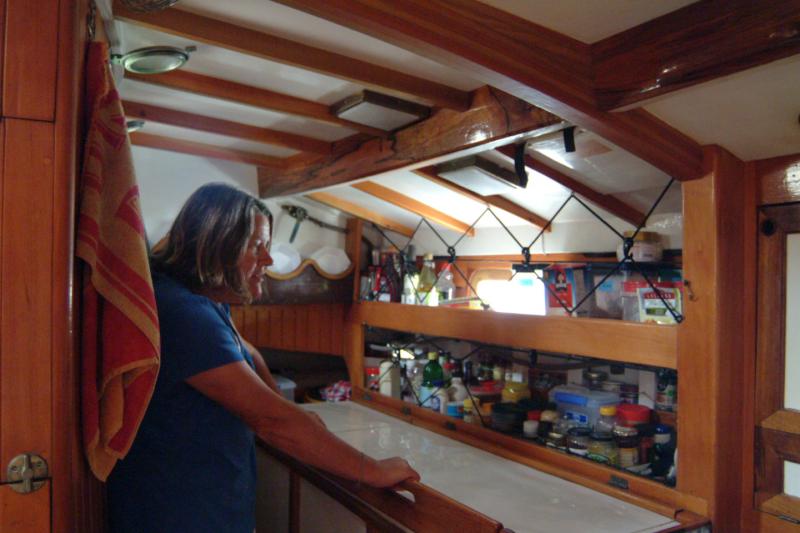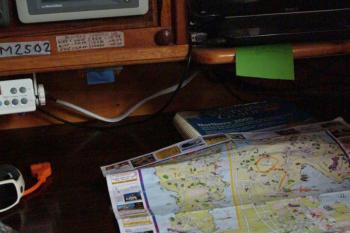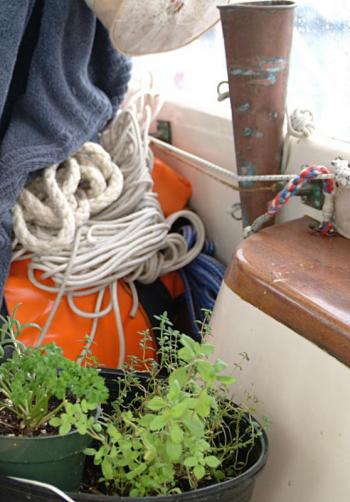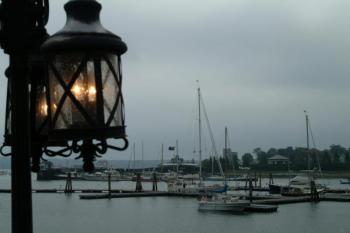ROCKLAND — I wrote my first freelance story the summer I turned 30. I was living near Harvard Square in Cambridge, Mass., and spending a lot of time enjoying the performers on the street.
These nomadic buskers fascinated me, so I started to interview them to learn more about the decisions that led them to their, apparently, free and easy life. Of course, what lay under the surface was more complex than it looked from my 9-to-5 and roof-over-my-head perspective.
Live-aboard sailors are another class of people whose existence appears romantic and carefree from the safe and somewhat predictable shore.
This week, I met a couple from Auckland, New Zealand, who are two years into a journey on a 50-foot ketch. Moored in Rockland Harbor, Jim and Karin Lott invited me aboard Victoria, the wooden sailboat he and Karin are living and traveling on. It's a retirement voyage they've been planning for years.
They met in 1968 and were married four years later. Karin was a teacher. Jim taught navigation and seamanship for 25 years and worked in the boat building trade. In 1988 they launched Victoria, after cutting the trees and building her themselves. They raced her to Japan and back and sailed in the surrounding Pacific Ocean, and in 1993 took a two-and-a-half year trip that included stops in Alaska, the West Coast of North America and a run through the Panama Canal to Europe, where they toured the canals of France. Then they returned home.
“We had jobs to get back to, and no money,” Jim said.
After 10 more years on their jobs, in Aug. 2011, the couple retired and headed east, across the Pacific to Chile, a tw- month sail during which they spent only two weeks on land.
“We're going much slower this time,” Jim said.
They found that South American country most hospitable, from a human perspective, and spent time in the isolated southern village of Puerto Edén, population approximately 40. For one two-week stretch, the only humans they saw were the ones supposed to be aboard a distant ferry. They learned how to stock up on food, fuel, and the company of others.
Chile was safe and cheap, Argentina dysfunctional, and Brazil …
“Chaotic,” Karin said. “Totally chaotic. It's lovely.”
They spent five months in Brazil, using Jim's rudimentary Portuguese to navigate the potential hazards of a bureaucracy in which “the rules keep getting broken and nobody knows what they are, any rate.”
As we sat in Victoria's comfortable saloon and I looked over the many books on sea travel, navigation and survival, Jim and Karin told me about the wonders of the southern glaciers, the challenges of foreign governments, the unexpected kindness and flexibility of customs agents, and the search for safe anchorage in ports from Cape Horn to Canada.
“Jim grew up on boats,” Karin said. “I grew up on land.”
She was 25 the first time she sailed, with a 15-month old baby in her arms. That trip took the young family to Fiji on a 30-foot yacht. Over the years, the couple learned how to adapt to the demands of the sea, of a growing family, of aging, and of each other.
Life on land is “too predictable.”
She said people take too much for granted: “Hurricanes and the natural world, there's a sense of outrage when it happens to us. We're taming the world.”
For about half of their time, they are away from the structures and society of humanity, just the two of them aboard Victoria, a relatively small, oddly shaped home with a constantly changing perspective.
“It’s really just that there is a job to do and one that I would certainly not even try to do on my own,” Jim said. “Some people like single-handed sailing. Not me. Possibly the hard bit is in the first day or two when the destination seems so far away and that is depressing. We certainly worry about what the voyage will bring but the reality always seems not as bad.”
He quoted Mark Twain, saying, “I have had a great many troubles in my life but most of them never happened.”
Karin said living alone for long stretches with her lifelong companion is: “character building because you just cannot escape each other and have to get on with it. So you need to find a way to get mental space rather than physical space.”
“You become much more interdependent,” she said. “You just have to let things go and move on to achieve the common goal.”
“I’ve been sailing all my life both in the recreational and commercial world, so it seems second nature to be at sea,” her husband said. “But I still remain apprehensive about the things that can go wrong, weather is just one, but there are all sorts of systems on the boat that are vital and I’m always thinking about each one and how I would cope. Much harder as I get older. But it’s a million times better than sitting in front of a TV.
“Perhaps the greatest worry is how would Karin cope if something happens to me. I am the practical one and Karin is less so. But the alternatives have less appeal for us both so adapting is just a necessity.”
That summer of 1983, while I was working on my piece on buskers for The Tab, I began to see signs of the end of the era of free love that had reigned for a couple of decades. In the progressive environs of Cambridge, AIDS was just reaching the popular radar; a few folks wore buttons proclaiming that they were herpes-free. So I made a deal with God.
I'd done the first six months of a relationship, several times. But, other than my year-and-a-half long, failed first marriage, I'd never really experienced the kind of commitment spoken of in wedding vows. My roommate at the time was a graduate student from Kerala, in India. Alphy was a Catholic, married, with a handful of sons. We often talked about marriage and what it required.
“When you marry,” Alphy said, “you create a third entity, the marriage itself. That is the thing that you are committed to, even more than the other person. Even when you are angry or discouraged with the person, you are still committed to the marriage. You must still feed the relationship, no matter whether you want to even speak to the person with whom you share that commitment.”
“Marriage is sacrifice,” he told me. “Just when you think you have given all you rightfully should, it will be your turn to give again.”
That summer, I promised myself and whatever power might take me into consideration that I would wait for the person who would share such a commitment with me. Like Jim and Karin, Joe and I are constantly learning to put aside personal expectations for the sake of our continued journey together.
“It’s not all romantic and fun in the sun,” my new friends told me in an email message. “It’s actually very hard work. Just like operating a commercial vessel, charters, fishing or whatever at sea. It really is challenging both physically and mentally, but more rewarding than doing nothing.”
“When the challenges outweigh the rewards then we will go home. Or maybe we will stop when we become a menace to ourselves and everyone else.”
Shlomit Auciello is a writer and photographer living in Rockland. Her column appears here every week or so. She can be reached at auciello@midcoast.com.

































